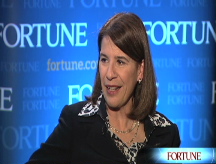Worst...Week...Ever!?
Housing starts may hit a 60-year low and consumer price drops could spread deflation fears. Yet, some experts see signs of hope.
NEW YORK (CNNMoney.com) -- If the Comic Book Guy character on "The Simpsons" were an economist, this might be his characterization of the next five days: Worst...Week...Ever!
Citigroup (C, Fortune 500) started the bad-news streak by announcing Monday that it would cut more than 50,000 jobs - nearly 15% of its workforce.
On Tuesday, the heads of General Motors (GM, Fortune 500), Ford (F, Fortune 500) and Chrysler are expected to plead their case to Capitol Hill for a federal bailout. Some experts fear that without government assistance, one or more of Detroit's Big Three could be forced to file for bankruptcy.
The following day the government is set to release two dismal pieces of October economic data: housing starts and the Consumer Price Index.
According to Briefing.com, economists predict housing starts of 780,000, which would be a post-World War II low. That follows on last month's bleak report, in which the Commerce Department reported September's new-construction permits hit a 17-year low.
For the Labor Department's monthly Consumer Price Index, economists predict a 0.8% decline in consumer prices. If this forecast is accurate, it would be the largest monthly drop since 1949. Add this to an expected 1.8% decline in wholesale prices for October, and more economists will likely be worrying about the ugly specter of deflation. (The government's Producer Price Index report is due out Tuesday.)
"This week should mark the end of the inflation scare of 2008," wrote David Kelly, chief market strategist for JPMorgan Funds, in a note to clients Monday morning.
Finally, the Conference Board will release its Leading Indicators report, an index of ten key economic factors - including credit spreads, consumer confidence, manufacturing orders and stock prices - for October on Thursday. The index is expected to fall 0.6%.
Mercifully, there are no major economic reports or significant corporate earnings announcements set for Friday. But even with this reprieve, it is painstakingly clear that consumers and investors will have little relief this week from the unrelenting tide of bad economic news.
"For right now, the forces of recession are in the ascendancy," Kelly wrote.
Still, some see faint glimmers of hope amidst all this doom and gloom.
Kurt Karl, chief U.S. economist with Swiss Re, said he thinks the Federal Reserve will lower rates by a half-percentage point, to 0.5%, at its December 16 meeting.
In addition, he sees the declines in October PPI and CPI as a boon from the pullback in the price of oil and other commodities - not a harbinger of deflation.
"There is some good news with the PPI and CPI. The decline in energy prices is a positive for businesses and consumers," Karl said.
Michael Strauss, chief economist with Commonfund, a Wilton, Conn.-based money management firm, pointed to the surprise increase in October's industrial production, which was reported Monday, as a positive sign. However, the main reason for the spike was because September production had dropped 3.7%, the biggest decline since 1946.
Still, Strauss noted that even though the credit crisis had some impact on production falling in September, Hurricanes Gustav and Ike as well as a strike at aerospace giant Boeing (BA, Fortune 500) also played a role.
"That shows that some of the horrible weakness of the past 40 to 45 days was related to other events," he said.
Finally, Strauss argued that there is slight cause for optimism in the widely expected terrible housing starts figures because a drop-off in building activity could help stabilize prices by lowering supply.
"If we talk about what we need to end the housing woes, everyone agrees that a reduction of inventory is necessary," Strauss said. "There are scary aspects of this week's numbers, particularly with housing, but there are signs that it's not all a disaster."
Of course, this is not to suggest that the economy is headed for an immediate upswing. But as I've argued in this column for some time, this slowdown (which has inexplicably still not been declared a recession yet) is probably closer to the end than the beginning.
Hopefully, a combination of aggressive action by the U.S. government and nations around the world to address the credit crisis will lay the groundwork for a recovery. In fact, Kelly wrote that he's confident a new federal stimulus package will happen before President-elect Obama takes office.
What's more, he noted that promises made by worldwide political leaders during this past weekend's G-20 summit were encouraging. They have agreed to address economic weakness through coordinated efforts.
"There is a good chance that the leading indicators and the economy itself will show some signs of improvement early in the new year," Kelly wrote.



